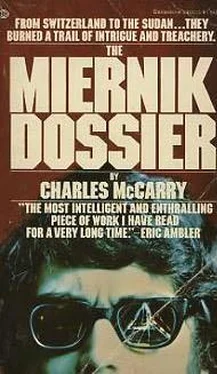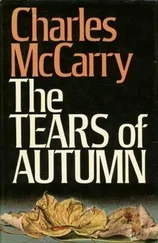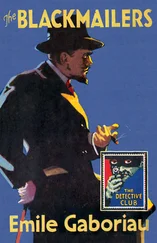I got out my copy of Schiller and read for a few minutes. When I looked up, Zofia was reading her book. I paid and left. The police across the street gave me a routine glance. I walked along the route Miernik had laid out in his instructions, but stopped a block short of Drevena Námestie, the street in which the black Citroën was supposedly waiting. There were no police in sight and almost no one else, except for an occasional housewife going in or out of a bakery on the corner. In moments, Zofia came along, followed by a man in workman’s clothes who had his eyes fixed on her buttocks. She has a brisk way of walking with her heels clicking on the pavement and her head held high; I wondered if she had ever been to drama school-it is the walk of an actress. When she saw me she did not hesitate, but strode right up to me with her hand held out. She has her brother’s handshake-up, down, moist palm. The workman, with a look of regret, continued on his way.
“This is the wrong place,” Zofia said. “We must go on to the next street to find Sasha.”
Zofia was in command of the situation, smiling and calm. We might have been childhood friends who met on this corner every day. When I took her arm and began to walk in the wrong direction, her muscles grew tense, but she followed along.
“There has been a small change in plans,” I said. “Let’s walk for a moment.”
We were speaking German. Zofia’s voice is low, but it carries very well. “I am not free to accept changes in the plan,” she said, smiling into my face. A woman in a kerchief, passing by with a string bag full of bread, looked at us in a startled way and scurried on. At the other end of the street a pair of policemen appeared, and the woman headed straight for them. She seemed to be walking faster than before, and I expected that she would report that a pair of strangers were lurking behind her, talking in a foreign language.
“Those policemen may be here in a minute,” I said. “You are a Swiss tourist named use Oprecht. I am your husband, Johann. We live in Zurich, and we entered Czechoslovakia on June 12 at Cheb, coming from Germany.” I gave her the wedding ring and, after a moment’s hesitation, she slipped it on her finger. When I asked if she was carrying any papers that conflicted with the ones I had for her, she shook her head.
“Sasha took everything,” she said.
I told her I had her passport and a wallet full of other papers. “You can tell the police I always carry all the papers because I’m a domestic tyrant,” I said.
“Here they come,” Zofia said. My back was to the police. “The woman crossed the street without talking to them, but they are coming anyway. They are walking slowly.”
We went into the bakery. The girl behind the counter did not understand German. Zofia, smiling, struck up a conversation in pantomime. She and the clerk giggled back and forth over a tray of pastries. Zofia took one, bit into it, made a delighted face, and offered it to me. I took a mouthful and tried to duplicate Zofia’s look of pleasure. The police stopped outside the shop and stood side by side, staring though the display window. We went on buying pastries. The girl put the half-dozen we selected into a screw of paper and helped us count out the necessary coins. She showed us to the door and opened it for us. Its little bell tinkled.
The police were still on the sidewalk. Under their caps and crossbelts they were young boys. Zofia, her whole body signaling gaiety and holiday sexuality, gave them a bright smile and took my arm. They let us walk by. Zofia looked up at me, laughed, and put her head on my shoulder. I kissed her on the forehead. One of the young policemen said something in a low voice. The other laughed. They turned around and went back to their post at the other end of the street.
Once around the corner, Zofia slowed our pace. “We must go to Sasha at once,” she said. “I don’t know what all this business about Swiss passports is supposed to mean, but I know nothing about it. What did my brother tell you to say to me?”
I had forgotten to give her the identifying phrase supplied by Miernik. There had hardly been time to do so, and I began to wonder if there ever would be. Two new pairs of policemen were now in sight at either end of the narrow street in which we were walking.
“Your brother told me to say that Sasha likes to eat his turnips by an open window,” I said.
She looked relieved and responded, “Les couleurs de Princeton sont orange et noir.”
“Well, I guess you are you and I am I,” I said.
She giggled. “No one but Tadeusz could have invented that greeting.”
Zofia’s lack of nervousness was having an effect on me. She seemed to feel no fright at all, and that was a good deal more than I could say. Those constant glimpses of police, and the ostentatious curiosity they showed in us, did not make for a relaxed atmosphere.
“We can’t stand on corners talking,” Zofia said. “We’re already five minutes late, and Sasha will have moved the car. It’s a long walk to the new meeting place and we have only fourteen minutes. Come.”
She set off briskly. I had a choice of following or getting into an arm-pulling match. I followed.
As we walked I told her of the new plan. She set her lips and shook her head, and I could see a resemblance to Miernik. That is one of his gestures. She has others-brothers and sisters sometimes may not look much alike, but they keep the facial expressions and the movements of the body they acquired in childhood.
“What you have in mind will never work. Nobody can cross the frontier on a riverboat,” Zofia said.
“People do it every day.”
“Not people with false passports. They will know who came across at Cheb on June 12. Herr und Frau Oprecht will not be on the list. You can’t fool them. They have had too much practice.”
It was obvious that I was never going to get her on a river steamer. The psychology of this kind of work is very odd. My first worry was not that the plan had failed, but that she was now in a position to blow my cover to Miernik by telling him that I’d turned up with a pocketful of perfect forgeries. Would this proof of my sponsorship (who but an intelligence agency could produce false passports on such short notice?) ruin the purpose for which we’d taken the risk of going in after Zofia? Obviously Miernik would only bring me into whatever he was doing in Sudan if he could keep up the pretense that I am a good-hearted, slow-witted American. I wondered why we didn’t think of this.
Zofia led me through the back streets of Bratislava as if she had lived there all her life. She crossed intersections, cut through parks, turned into alleys with no more hesitation than I would have shown in Boston. We must have encountered twenty teams of policemen; they passed Zofia from one guard post to another in a linked series of hungry stares. At length we turned a corner and there, parked in the shade of a flowering tree that hung over the wall of a little graveyard, was the black Citroën. A small bald man sat in the front seat with his hands on the wheel. There were no police in sight. “You in the front,” Zofia said briskly, as she tucked her legs into the back seat and closed the door behind her.
The bald man held out his hand to me. “Sasha Kirnov,” he said. “It’s very kind of you to go to all this trouble.”
Kirnov put the car in gear and moved off through the empty streets. “These Communist towns,” he said matter-of-factly, “have the advantage of being very quiet-nothing like the traffic you have in the West. And some of them, particularly here in Czechoslovakia, are quite beautiful. It’s a pity you haven’t more time. Not many Americans see this part of the world.” He turned his head and smiled; he might have been a host, collecting a weekend visitor at the station.
Читать дальше












